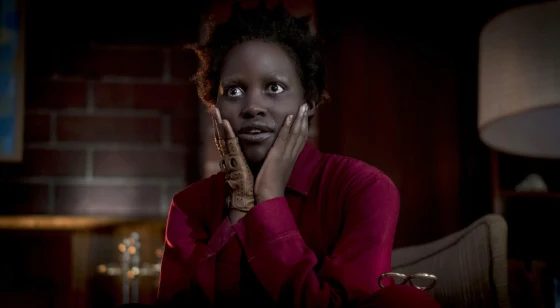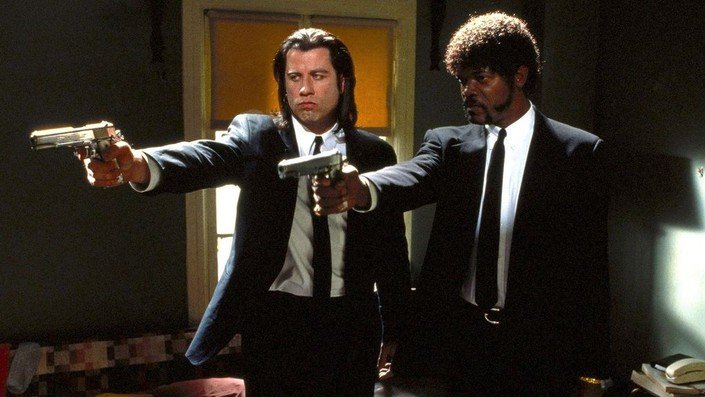
When Jordan Peele released his acclaimed film Get Out in 2017, the film industry was stunned. Here was a former comedian, debuting as a director, who had created a psychological horror masterpiece — a film that not only terrified audiences but also delivered a sharp social commentary.
With Us (2019), Peele proves that his success was no beginner’s luck. He cements his place as one of the most insightful and daring filmmakers of our time, delivering a story that is as chilling as it is thought-provoking.
In this review, we’ll dive deep into this modern horror classic, exploring its themes, symbols, and cinematic techniques that elevate Us to an extraordinary level.
The Trauma That Haunts Us
The story begins innocently enough: the Wilson family heads to their beach house, where mother Adelaide experienced a terrifying childhood trauma. Ever since that incident, she has lived with a lingering sense of dread — a feeling masterfully conveyed through Lupita Nyong’o’s nervous and restrained performance.
As the family settles in, subtle signs begin to unsettle Adelaide — coincidences, eerie warnings, and a sense of impending doom. When her son notices four mysterious figures standing at the edge of their driveway, the tension explodes. These strangers aren’t just trespassers — they are the Wilsons’ exact doubles.
The Doppelgänger Concept: Who Are We?
The idea of the “double” has long been a staple of horror and psychological thrillers, tapping into deep existential fears. Peele takes this concept and amplifies it: by confronting the Wilsons with their own doppelgängers, he forces both the characters and the audience to question identity itself.
Are we truly the people we think we are? Do we have a hidden, darker version of ourselves lurking in the shadows? And what happens when that hidden self decides to rise to the surface?
This haunting premise fuels the sense of unease throughout the entire film, making Us not just a story of survival but also a disturbing exploration of human duality.
Social Commentary: The Resentment of the Forgotten
Like Get Out, Us uses the horror genre as a powerful vehicle for social critique. Beneath the home-invasion horror, Peele crafts a sharp commentary on consumerism, inequality, and the silent rage of the marginalized.
The Wilsons’ doppelgängers — part of a larger network of “shadow people” living underground — symbolize the forgotten, the oppressed, the invisible members of society left behind while others thrive. Their uprising is fueled by decades of neglect and anger, a chilling metaphor for real-world social divides.
Us challenges viewers to confront uncomfortable questions: Who are “the others” in our own lives? Do we really see them, or do we ignore their existence to preserve our comfort and privilege?
Symbolism and References: Decoding Peele’s World
Us is layered with symbols and references that make it a rewarding experience for viewers willing to look deeper. From the recurring rabbits to nods to Alfred Hitchcock, Peele fills his world with clues that invite analysis.
The rabbits — often symbols of innocence — take on a sinister tone here, hinting at primal instincts and captivity, and perhaps suggesting that the tethered are the result of human experiments gone wrong.
Peele’s Hitchcock references are more than homage. By integrating Hitchcockian tension, meticulous framing, and the concept of the double, Peele evolves the language of suspense cinema while honoring its roots.
Technical Brilliance and Performances
Beyond its thematic depth, Us shines in its technical execution. Peele demonstrates a masterful command of cinematic language, using every element — cinematography, sound, pacing, and performance — to heighten unease.
Mike Gioulakis’ cinematography is striking, with sharp contrasts, vibrant colors, and ominous shadows creating a visual landscape that mirrors the story’s duality. Michael Abels’ score, blending whispers with dissonant crescendos, amplifies the tension and dread at every turn.
Lupita Nyong’o delivers a career-defining dual performance, shifting seamlessly between Adelaide’s vulnerability and her doppelgänger’s terrifying presence. Winston Duke, Elisabeth Moss, and the younger actors also shine, grounding the surreal narrative with authentic, emotional performances.
The Legacy of Us
With Us, Jordan Peele solidifies his status as one of the most innovative filmmakers of our generation. This is not just horror; it’s artful storytelling with layers of meaning that resonate long after the credits roll.
It’s a visceral, thought-provoking exploration of identity, inequality, and fear — a film that rewards multiple viewings and sparks endless conversations.
Years from now, Us will be remembered not just as a horror film but as a cultural milestone — a story that dared to hold up a mirror to society and forced us to confront what we saw.
Final Verdict: Us is an unforgettable cinematic experience — terrifying, intelligent, and masterfully crafted. If you haven’t seen it yet, don’t miss your chance to witness one of the most important horror films of the decade.


